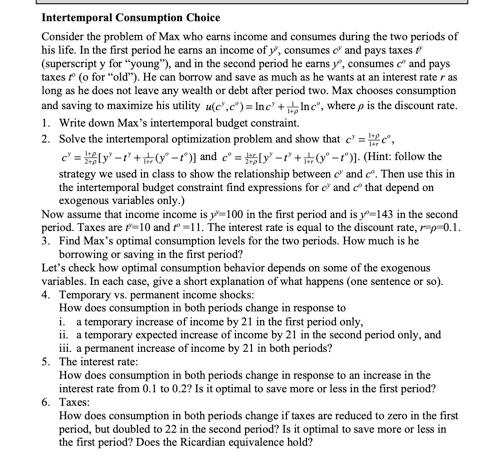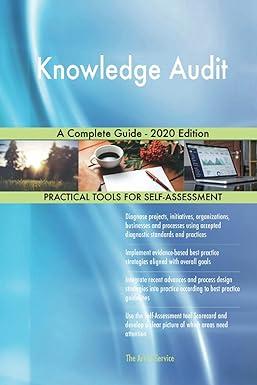
Intertemporal Consumption Choice Consider the problem of Max who earns income and consumes during the two periods of his life. In the first period he earns an income of y', consumes d' and pays taxes (superscript y for "young"), and in the second period he earns y, consumes cand pays taxes (o for "old"). He can borrow and save as much as he wants at an interest rate r as long as he does not leave any wealth or debt after period two. Max chooses consumption and saving to maximize his utility ue",c")= Inc' + Inc", where p is the discount rate. 1. Write down Max's intertemporal budget constraint. 2. Solve the intertemporal optimization problem and show that come, d'Ely-+ (-1) and c = WT-1 + + (x - 1)]. (Hint: follow the strategy we used in class to show the relationship between d' and c". Then use this in the intertemporal budget constraint find expressions for e' and that depend on exogenous variables only.) Now assume that income income is y=100 in the first period and is yo=143 in the second period. Taxes are -10 and r =11. The interest rate is equal to the discount rate, r-p0.1. 3. Find Max's optimal consumption levels for the two periods. How much is he borrowing or saving in the first period? Let's check how optimal consumption behavior depends on some of the exogenous variables. In each case, give a short explanation of what happens (one sentence or so). 4. Temporary vs. permanent income shocks: How does consumption in both periods change in response to i. a temporary increase of income by 21 in the first period only, ii. a temporary expected increase of income by 21 in the second period only, and iii. a permanent increase of income by 21 in both periods? 5. The interest rate: How does consumption in both periods change in response to an increase in the interest rate from 0.1 to 0.2? Is it optimal to save more or less in the first period? 6. Taxes: How does consumption in both periods change if taxes are reduced to zero in the first period, but doubled to 22 in the second period? Is it optimal to save more or less in the first period? Does the Ricardian equivalence hold? Intertemporal Consumption Choice Consider the problem of Max who earns income and consumes during the two periods of his life. In the first period he earns an income of y', consumes d' and pays taxes (superscript y for "young"), and in the second period he earns y, consumes cand pays taxes (o for "old"). He can borrow and save as much as he wants at an interest rate r as long as he does not leave any wealth or debt after period two. Max chooses consumption and saving to maximize his utility ue",c")= Inc' + Inc", where p is the discount rate. 1. Write down Max's intertemporal budget constraint. 2. Solve the intertemporal optimization problem and show that come, d'Ely-+ (-1) and c = WT-1 + + (x - 1)]. (Hint: follow the strategy we used in class to show the relationship between d' and c". Then use this in the intertemporal budget constraint find expressions for e' and that depend on exogenous variables only.) Now assume that income income is y=100 in the first period and is yo=143 in the second period. Taxes are -10 and r =11. The interest rate is equal to the discount rate, r-p0.1. 3. Find Max's optimal consumption levels for the two periods. How much is he borrowing or saving in the first period? Let's check how optimal consumption behavior depends on some of the exogenous variables. In each case, give a short explanation of what happens (one sentence or so). 4. Temporary vs. permanent income shocks: How does consumption in both periods change in response to i. a temporary increase of income by 21 in the first period only, ii. a temporary expected increase of income by 21 in the second period only, and iii. a permanent increase of income by 21 in both periods? 5. The interest rate: How does consumption in both periods change in response to an increase in the interest rate from 0.1 to 0.2? Is it optimal to save more or less in the first period? 6. Taxes: How does consumption in both periods change if taxes are reduced to zero in the first period, but doubled to 22 in the second period? Is it optimal to save more or less in the first period? Does the Ricardian equivalence hold







